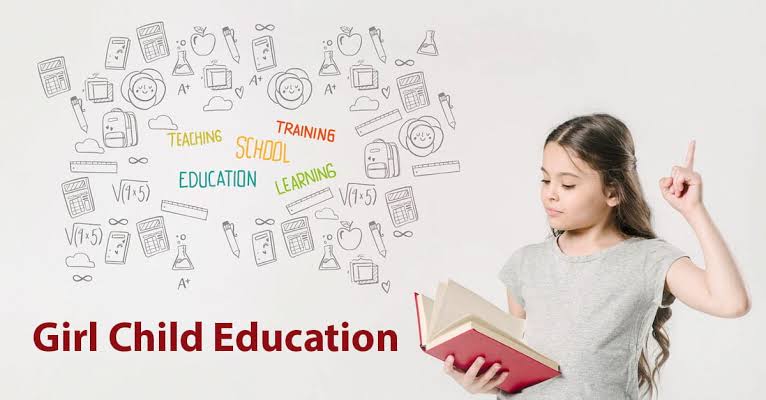The Importance of Girl Child Education: Empowering a Nation

Education is one of the most powerful tools for transforming lives, communities, and nations. While progress has been made in improving access to education globally, girls still face significant barriers in many parts of the world. Educating the girl child is not just a matter of basic rights; it is a strategic investment in the future. When girls are educated, families are healthier, economies grow stronger, and societies become more equal and just.
What is Girl Child Education?
Girl child education refers to the formal and informal learning opportunities provided to girls from early childhood through adulthood. This includes access to schools, skill-building programs, literacy training, and life education. It ensures that girls not only enroll in school but also complete their education and acquire the skills needed to live independent, empowered lives.
Why Is Educating the Girl Child So Important?
1. Fundamental Human Right
Education is a basic human right recognized in international treaties and national laws. Every child, regardless of gender, deserves the opportunity to learn and grow. Denying education to girls is a direct violation of their rights and limits their potential.
2. Economic Development
Educated girls grow into economically productive women. When girls stay in school, they acquire skills that open up employment and entrepreneurship opportunities. This boosts household income and contributes to national economic growth. Studies show that every extra year of education can increase a woman’s earning potential by up to 20%.
3. Healthier Families
Educated women are more likely to make informed decisions about health, nutrition, and hygiene. They are more likely to access prenatal care, immunize their children, and adopt healthy practices. This leads to lower child mortality, improved maternal health, and better overall well-being for families.
4. Reduced Child Marriage and Teen Pregnancy
Girls who attend school are less likely to marry early and have children as teenagers. Education delays marriage, allowing girls to mature physically and emotionally before starting families. It also protects them from gender-based violence and exploitation.
5. Empowerment and Confidence
Education equips girls with knowledge, self-esteem, and decision-making power. An educated girl is more likely to stand up for her rights, resist discrimination, and participate in social and political life. This empowerment creates ripple effects in communities and generations to come.
6. Breaking the Cycle of Poverty
Educating girls is one of the most effective ways to break the intergenerational cycle of poverty. Educated mothers are more likely to send their own children—especially daughters—to school, creating a virtuous cycle of learning and opportunity.
Barriers to Girl Child Education
Despite its benefits, many girls are still denied education due to:
1. Poverty
In poor families, boys are often prioritized for education while girls are expected to stay home, work, or care for siblings. Families may also lack money for school fees, uniforms, or transportation.
2. Gender Discrimination
Cultural beliefs and social norms in many communities discourage girls from attending school. Some believe that a girl’s place is in the home or that investing in her education is a waste.
3. Early Marriage
Many girls are forced into marriage as teenagers, cutting short their education. Once married, their focus shifts to household responsibilities and childbearing.
4. Violence and Harassment
Girls often face sexual harassment and violence on the way to or at school. This fear can lead parents to keep their daughters at home.
5. Lack of Sanitary Facilities
Inadequate toilets and lack of menstrual hygiene support in schools can cause girls to miss classes or drop out altogether during puberty.
Solutions to Promote Girl Child Education
Promoting girl child education requires a comprehensive approach involving governments, communities, families, and international organizations:
1. Free and Compulsory Education
Governments should enforce policies that make primary and secondary education free and compulsory for all children, including girls.
2. Financial Support
Providing scholarships, free school meals, uniforms, and transport can help relieve the financial burden on poor families and encourage them to keep girls in school.
3. Safe Learning Environments
Schools must be safe, inclusive, and girl-friendly. This includes hiring female teachers, preventing sexual harassment, and ensuring access to proper sanitation facilities.
4. Community Awareness
Changing harmful cultural norms requires community engagement. Parents, religious leaders, and local influencers should be educated on the importance of educating girls and the long-term benefits it brings.
5. Legal Protections
Governments must enforce laws against child marriage, gender discrimination, and violence against girls. Legal systems should protect girls’ rights to education and safety.
6. Life Skills and Vocational Training
Beyond academics, girls should be taught life skills, financial literacy, and job-ready skills to prepare them for independent and successful futures.
Global Progress and Success Stories
- Bangladesh: A strong focus on female education, stipends for girls, and awareness programs helped increase girls’ school enrollment and reduce child marriage.
- Rwanda: The government has prioritized gender equality in education, leading to nearly equal enrollment of boys and girls in primary school.
- Malala Yousafzai, a Pakistani activist, became a global symbol of the fight for girls’ education after surviving a Taliban attack. Her efforts have inspired millions and brought international attention to the issue.
The Role of Men and Boys
Educating the girl child is not just a “women’s issue.” Men and boys have a vital role to play by:
- Supporting girls in their families and communities
- Challenging sexist beliefs and gender stereotypes
- Promoting shared responsibilities at home
- Advocating for equal opportunities for their sisters, daughters, and friends
Conclusion
Educating the girl child is not just a moral obligation—it is a smart investment in the future. It builds healthier families, stronger economies, and more peaceful societies. When a girl is educated, she doesn’t just change her own life; she transforms her entire community. Every girl, regardless of her background, deserves the chance to learn, lead, and shine.
Let’s invest in girls. Let’s invest in the future.







